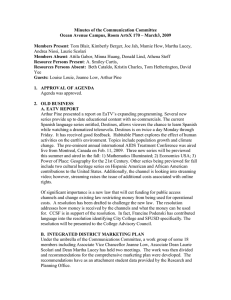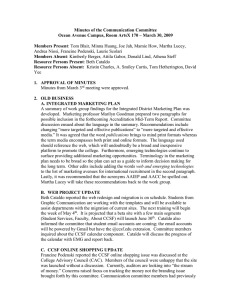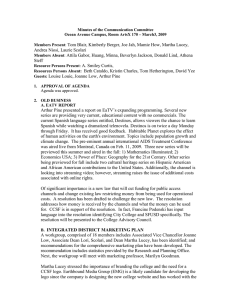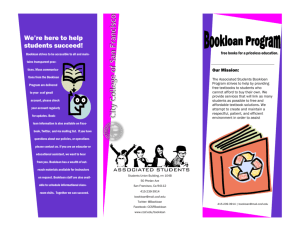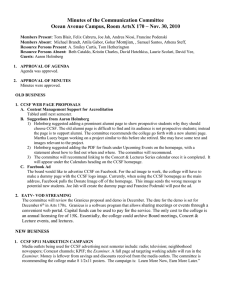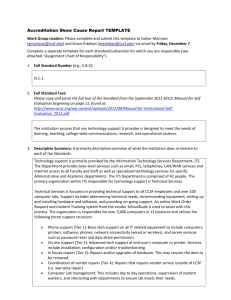090330
advertisement
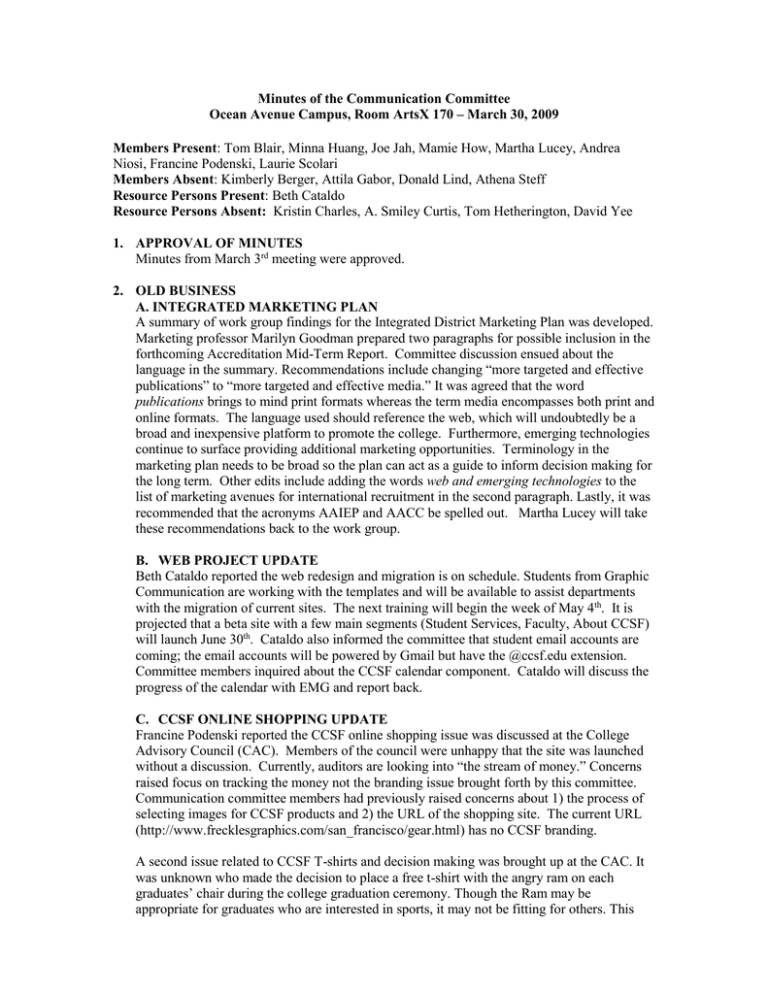
Minutes of the Communication Committee Ocean Avenue Campus, Room ArtsX 170 – March 30, 2009 Members Present: Tom Blair, Minna Huang, Joe Jah, Mamie How, Martha Lucey, Andrea Niosi, Francine Podenski, Laurie Scolari Members Absent: Kimberly Berger, Attila Gabor, Donald Lind, Athena Steff Resource Persons Present: Beth Cataldo Resource Persons Absent: Kristin Charles, A. Smiley Curtis, Tom Hetherington, David Yee 1. APPROVAL OF MINUTES Minutes from March 3rd meeting were approved. 2. OLD BUSINESS A. INTEGRATED MARKETING PLAN A summary of work group findings for the Integrated District Marketing Plan was developed. Marketing professor Marilyn Goodman prepared two paragraphs for possible inclusion in the forthcoming Accreditation Mid-Term Report. Committee discussion ensued about the language in the summary. Recommendations include changing “more targeted and effective publications” to “more targeted and effective media.” It was agreed that the word publications brings to mind print formats whereas the term media encompasses both print and online formats. The language used should reference the web, which will undoubtedly be a broad and inexpensive platform to promote the college. Furthermore, emerging technologies continue to surface providing additional marketing opportunities. Terminology in the marketing plan needs to be broad so the plan can act as a guide to inform decision making for the long term. Other edits include adding the words web and emerging technologies to the list of marketing avenues for international recruitment in the second paragraph. Lastly, it was recommended that the acronyms AAIEP and AACC be spelled out. Martha Lucey will take these recommendations back to the work group. B. WEB PROJECT UPDATE Beth Cataldo reported the web redesign and migration is on schedule. Students from Graphic Communication are working with the templates and will be available to assist departments with the migration of current sites. The next training will begin the week of May 4th. It is projected that a beta site with a few main segments (Student Services, Faculty, About CCSF) will launch June 30th. Cataldo also informed the committee that student email accounts are coming; the email accounts will be powered by Gmail but have the @ccsf.edu extension. Committee members inquired about the CCSF calendar component. Cataldo will discuss the progress of the calendar with EMG and report back. C. CCSF ONLINE SHOPPING UPDATE Francine Podenski reported the CCSF online shopping issue was discussed at the College Advisory Council (CAC). Members of the council were unhappy that the site was launched without a discussion. Currently, auditors are looking into “the stream of money.” Concerns raised focus on tracking the money not the branding issue brought forth by this committee. Communication committee members had previously raised concerns about 1) the process of selecting images for CCSF products and 2) the URL of the shopping site. The current URL (http://www.frecklesgraphics.com/san_francisco/gear.html) has no CCSF branding. A second issue related to CCSF T-shirts and decision making was brought up at the CAC. It was unknown who made the decision to place a free t-shirt with the angry ram on each graduates’ chair during the college graduation ceremony. Though the Ram may be appropriate for graduates who are interested in sports, it may not be fitting for others. This situation again brings to light that a need exists for either an office or committee to oversee the CCSF brand. 3. NEW BUSINESS A. CCSF DIGITAL SCREENS – PROGRAM FORMAT AND INSTALLATION Podenski reported about a contract signed by the district on September 8, 2008 with a company that installs free large digital flat screens to college campuses at no charge to the college. The digital screens are compatible for use as a district wide emergency alert system and can also be programmed with information of interest to all students, faculty and staff. It is important to note that the contract to install digital screens at various locations throughout the San Francisco Community College District was signed by district representatives prior to proposing the idea through shared governance. The Communications Committee, having only recently learned about the screen, would have been the appropriate committee to initially consider the proposal for digital screens and to then make recommendations to the College Advisory Council where a final decision would have been made prior to signing the contract. The company provides digital screens ranging in size from 37 inches to 101 inches. Program content on the screens includes Reuter’s News text scrolling along the bottom o f the screen and advertising in the upper right of the screen. City College of San Francisco has right of refusal on all proposed advertisements. Each college is responsible for programming the content that appears in the remaining screen area. Broadcast Media Services has scheduled the installation of a test screen and will experiment with sending program content to the test screen. After the demo screen is fully programmed, the college community will be invited to review the programming and advertisements and present feedback and input and suggest recommendations regarding additional screen installations in various district locations. The Communications committee will consider all campus community input and reflect that input in committee recommendations for the next steps to College Advisory Council. The issue of advertising on campus is a major issue. Committee members were not happy to hear that a contract exists that will bring more advertising to campus without having gone through the shared governance process. A student representative on the committee reported that the Ocean campus Associated Students was initially involved with the digital screen project and then later discontinued involvement because of concerns about allowing advertising on campus. Committee members agree that resources should not be spent on these screens. Money would be better spent on EATV which hasn’t enough resources and reaches a far greater number of viewers. Committee members directed the committee chair to inform the College Advisory Council at their next meeting (April 2, 2009) that any there are serious concerns about allowing advertising of any sort on City College of San Francisco campuses. B. K-12 OUTREACH PROJECT Laurie Scolari reported on a two new video project funded by SFUSD’s Gear Up Program, CCSF’s Outreach and Recruitment Office and in consultation with the Publicity Office and Broadcast Electronic Media Arts department. “The Ambassador Diaries” and “CCSF Student Support Services Video Tour” will be video podcasts (vodcasts) available through iTunes U. The goal of the Ambassador Diaries is to use current students and their stories to connect with potential students to help them realize the community college pathway. The CCSF Student Support Services Video Tour provides an overview of services available to students when they arrive at college. Vodcasts will be available in the fall on iTunes. Committee members agree these projects are a great way to promote City College and potential exists for future uses in different languages.
